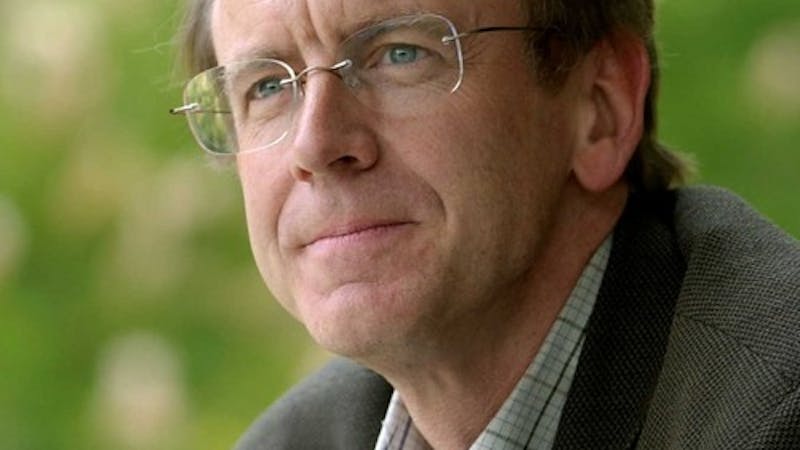
Letter From the Editor
Welcome to the Thresher centennial magazine. Rice recently celebrated its centennial in 2012, so it should come as no surprise that the Thresher is soon after celebrating its own 100-year anniversary.

Welcome to the Thresher centennial magazine. Rice recently celebrated its centennial in 2012, so it should come as no surprise that the Thresher is soon after celebrating its own 100-year anniversary.
Who here remembers the RU Observer? If you’re a freshman you most likely have no clue what I’m talking about. But for the older members of the Rice community, the RU Observer occupies a specific niche in our institutional memory. They were the digital-first outlet, the disruptor, the Buzzfeed of Rice, and they acted as a supplementary news source to the Thresher, for better or for worse.

Despite his ouster as CEO of United Airlines over a breach of ethics, Jeff Smisek is staying on with the Rice University Board of Trustees. Smisek resigned from the company last September after a Department of Justice investigation into claims that he bribed the Port Authority of New Jersey and New York.
Rice has recently reached a new level of positive PR in national media outlets. The coverage has centered around the Entrepreneurship Initiative launched in 2015, a well-funded push to expand the academic, extracurricular and co-curricular re-sources for entrepreneurs at Rice. The university was featured in a front-page article in the Dec.

General Tom Kolditz stood in front of a crowd of Rice University parents during Families Weekend in October and began describing the World War II surrender of a German command to General Charles Canham.
Rice University Police Department officers are “officers of the state” according to a May 11 ruling by the Texas State Supreme Court. As officers of the state, they have the power to enforce the laws of Texas within their jurisdictions, which includes the Rice campus and Harris County.“[T]he private university police officer is an officer ‘of the state’ because by statute the Legislature has conferred on him the authority to enforce state law on the Rice campus, a public purpose and vested him with all a police officer’s powers, privileges and immunities,” the ruling read. The decision also granted RUPD the right of interlocutory appeal, which gives them the ability to appeal rulings previously made by appellate courts before any trial could occur. The ruling came on a false imprisonment case brought by a man who was arrested by an RUPD officer on drunk driving and evading arrest charges after a car chase near campus. He then sued the officer and Rice for false imprisonment, negligence, gross negligence, assault and intentional infliction of emotional distress.In a written statement, RUPD Chief of Police Johnny Whitehead said RUPD supports the Supreme Court decision. He said the ruling does not change RUPD’s mission and operations, but instead affirms their rights as officers.“Our officers face the same dangers as any other peace officer in the state and deserve the same protections and rights,” Whitehead wrote. RUPD came under scrutiny in 2014 for alleged misconduct during a bike theft. A dashboard camera video from the incident shows two RUPD officers using batons on the suspected thief as two others attempt to handcuff the man’s arms while he resists arrest. A grand jury neglected to indict the two officers alleged of misconduct.The case has been remanded to the Court of Appeals for further proceedings.
The Student Association is considering a bill that will create a task force to examine the future of education at Rice University. Trent Navran, the SA Executive Vice President, introduced the bill to create the Rice Education of the Future task force at the Sept. 24 student senate meeting; the bill will be put up for vote at the senate meeting today, Wednesday, Oct. 1.Navran said the idea to form and chair the REF task force arose from discussions about the Rice experience that occurred during the centennial, such as the Student Vision for the Second Century.“Going as far back as the centennial ... one of the key priorities we wanted to emphasize [was] advancing the Rice education,” Navran, a McMurtry College senior, said. “[Students] came up with really neat ideas that weren’t really acted upon ... so we were kind of thinking about how we want to spend the year as a student association and … came to the conclusion that we could really benefit from focusing on the Rice experience, how we as a student government could advance it.”The task force plans to discuss integrating co- and extracurricular opportunities into the curriculum, promoting social impact, connecting Rice with the Houston community and adding value to the Rice education in the face of changes in digital education, among other topics.Navran began the process by collecting opinions on the Rice education from graduating seniors at the end of last year. He said the importance of co- and extracurricular activities emerged as a theme during those discussions.“A lot of people remark that they did all these cool things outside of the classroom despite their Rice courseload,” Navran said. “At some point, I think it would be fantastic to see things a lot more in alignment, that the things you’re learning in class are related to the questions you’re asking and sharing with your friends at lunch, which is related to the extracurriculars you’re taking on and the problems you want to solve.”The task force will include 11 members: four at-large undergraduate representatives, one senator, one college president, four new student representatives and Navran. Navran said he wants to include students with different academic interests on the task force.“Whether it’s advancing entrepreneurship, changing physical spaces on campus to enhance collaboration, or changing degree requirements to emphasize a more experiential learning process, it would be ideal to grow our team’s interests and abilities by finding people on campus who are plugged into different academic areas,”Navran said.Online EducationThe first line of the bill states: “Whereas, the proliferation of digital technologies and Massive Open Online Courses has caused higher education institutions to continually rethink their value proposition regarding their offerings to students and communities.”Navran said the increasing relevance of Massive Open Online Courses, or ‘MOOCs,’ such as Coursera and edX, both of which Rice participate in, has forced colleges to reevaluate their value to students.“There’s a threatening aspect of MOOCs, which is you no longer need to go to a place like Rice for a quality computer science class or go to Princeton for a high quality history class; you can take them from those institutions for free on Coursera,” Navran said. “What that means for institutions like Rice is they can no longer say they’re offering an amazing academic experience; the value proposition has to shift.”Reid Whitaker, Executive Director of the Center for Digital Learning and Scholarship at Rice University, said he views MOOCs as supplements to the Rice education in the future, though not replacing it entirely.“Rice is an institution that prides itself on small classrooms and interactions, especially the relationship between teacher and student,” Whitaker said. “What I do think that will happen is we will see more ways in which students can complete different courses that may not be the essential pieces [of a Rice education].”Whitaker said MOOCs have the potential to increase the academic breadth of a Rice education through facilitating interaction with other universities.“What’s inside the hedges is the best, but reaching out there and connecting with other professors, other students at other universities ... can really enhance the experience for all students,” Whitaker said. “While we may have some limitations with Rice in terms of some co-curricular activities, MOOCs can provide an opportunity to research about all sorts of things.”According to Duncan College senior Brian Baran, MOOCs will not fundamentally affect the education Rice currently offers.“I think there’s a reasonable case to be made that higher education on the level that Rice is providing is about a lot more than the classroom experience and that the classroom experience is about much more than the lectures and assignments,” Baran said. “It’s also about being in the classroom with people from a variety of backgrounds and having quality discussions that can’t yet really take place in an online environment.”Whitaker said he also thought MOOCs will not be able to replace the core Rice classroomexperience.“I think that MOOCs will never replace that laboratory experience, the immediate live conversation, the non-verbal, the connections, the experience of college,” Whitaker said. “That can never be replaced by a MOOC, and it can never get to that level.”Moving ForwardBaran said he believes the bill should be reworded to make it clear that the task force does not presuppose specific changes should be made to the Rice education.“We should first be asking whether we need to fundamentally change the way we approach higher education, because the answer to that question determines the type of adaptations that we should be making to new technologies and opportunities,” Baran said. “I think the language of the bill implies that we have already determined that major changes need to be made, and that’s a question that the task force should first be asking and considering.”Jones College senior Lillian Seidel teaches a section of UNIV 110: First Year Foundations. She said Rice should try to incorporate leadership and extracurricular commitments into its curriculum, citing the Certificate in Civic Leadership as an example.“[Education should be] about personal development, and that was mentioned in Leebron’s Vision for the Second Century,” Seidel said. “That is something important to consider, especially when moving forward and planning the next century of what a Rice education is going to look like.”The bill states the REF task force will submit its members for approval on Oct. 8, hold town hall meetings and conversations in October and November, present progress updates on the Oct. 15, Nov. 5 and Nov. 9 senate meetings, present a document of findings at the Nov. 29 senate meeting, and submit the document to the administration’s Quality Education Task Force and Office of the President before Dec. 5. Navran said he hopes the conversations leading up to the creation of the document will be fruitful.“There are a lot of points where there is a lot of constructive data coming in, and this document will hopefully be the culmination of all of that,” Navran said. “I’m hoping that, along the way, there will be a lot of things that can inform faculty [and] administrators about what really does matter most to students.”
In an email sent to the Rice Environmental Club on Sept. 3, Club President Hutson Chilton said the club would, among other initiatives and if members were interested, enact a campaign to encourage the university to withdraw from, or divest of, fossil fuel investments, following a trend at other American private universities.
Electrical and Computer Engineering Professor Richard Baraniuk founded Connexions in 1999 as a platform for a customizable textbook for his Signals and Systems class at Rice.